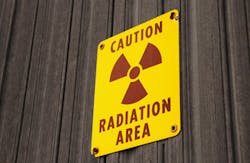Pennsylvania launches probe into effect of radiation in fracking wastewater
The potential danger of radioactivity associated with drilling wastewater in hydraulic fracturing has been an issue for a long time. In an attempt to find out if this is a threat to the general public, the state of Pennsylvania is starting a probe into the effects of radiation in natural gas drilling wastewater. Despite the fact that the Pennsylvania Department of Environmental Protection (DEP) has repeatedly denied any possible hazard from drilling wastewater, it has finally decided to look into the matter.
The Pennsylvania DEP said in a statement that it was committed to ensuring that oil and gas production in the state is carried out in the most environmentally friendly way possible. That is why the state of Pennsylvania will launch the biggest and most extensive research study into the level of natural radiation occurring in equipment and materials associated with oil and gas development, as well as its effect on nature and humans. According to Gov. Tom Corbett, the study will take between 12 and 14 months to complete. The DEP has appointed Perma-Fix Environmental Services to help conduct the research. The study plan will be peer-reviewed by independent researchers.
Radiation in its natural levels is safe and it is naturally present in a variety of environments, including underground rock formations. However, when naturally occurring radioactive material is treated and processed, it is possible that the levels of radioactivity become more concentrated, the DEP statement explained. Industry practices used at the moment do not indicate any health risk from exposure to radiation from these materials for workers or the general public. The study will give the DEP all data needed to conclude whether the naturally occurring radiation levels are safe in the long term and the materials are treated so that radioactive concentration does not exceed safe levels. The research will look into potential issues during the various stages of production, including extraction, transportation, treatment and disposal.
The statement suggests that radiation levels will be examined in frack flowback water, drill cuttings, drill mud, and the levels in equipment such as pipes, well casings storage tanks, treatment systems and trucks.
According to Pennsylvania DEP secretary Mike Krancer, the fact that the state is undertaking such a thorough study is a demonstration of its intention to responsibly oversee the exploration and production of natural gas. This is not the first time Krancer has expressed his doubts that federal control over oil and gas drilling could be as effective, according to State Impact website.
Naturally Occurring Radioactive Material, or NORM, is buried beneath the soil across the state, State Impact said. Marcellus Shale, which is estimated to be one of the biggest natural gas reserves in the United States, with some 500 trillion cubic feet of gas locked underground, is considered to be highly radioactive by a U.S. Geological Survey. It contains radioactive elements like uranium, thorium, radium-228 and radium-226. The radioactive material can be released through the drilling process in drill cuttings and flowback water, experts warn.
